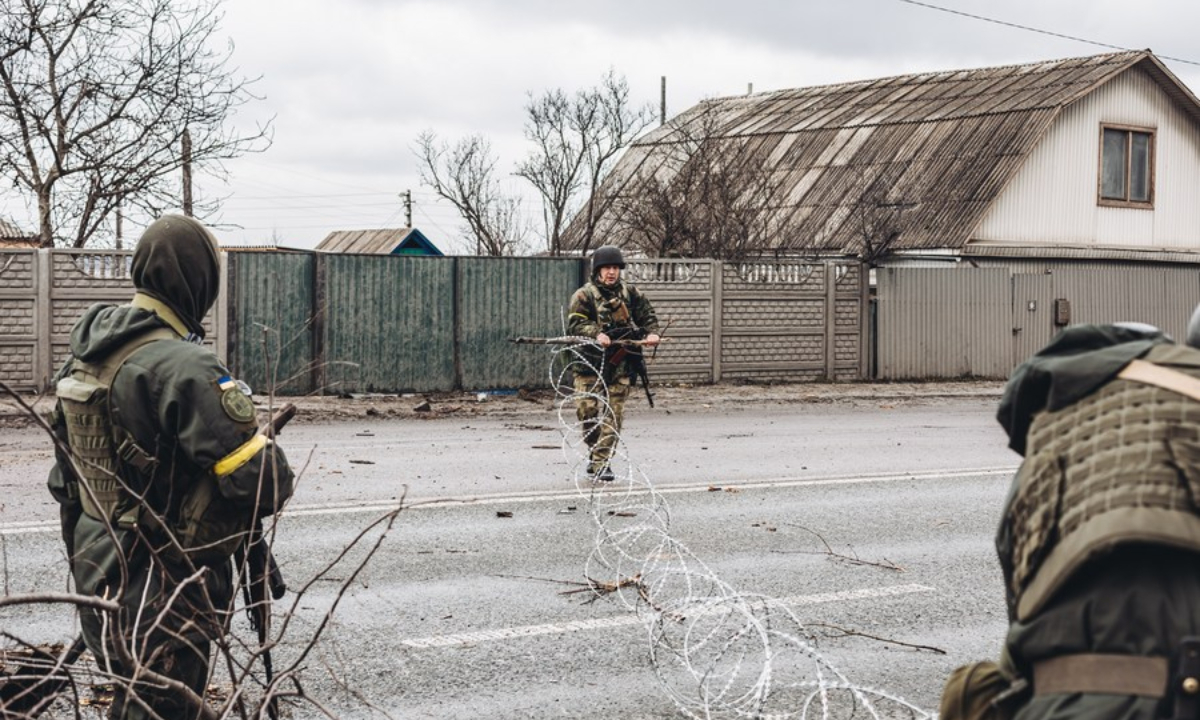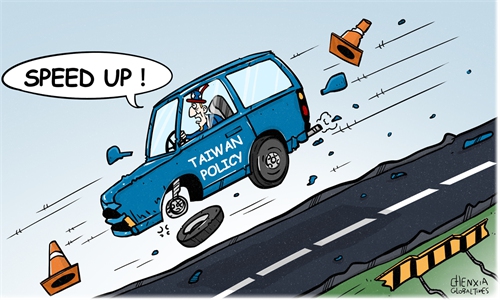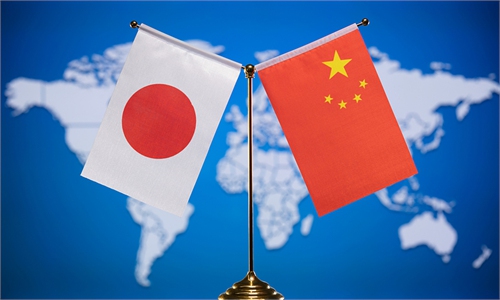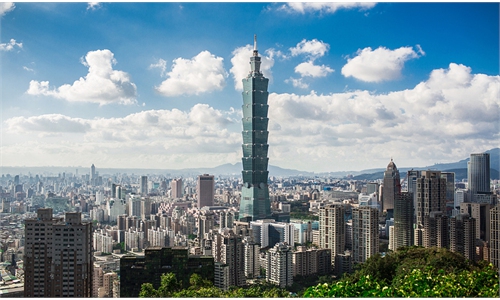IN-DEPTH / IN-DEPTH
Hyping 'Taiwan volunteers on Ukraine battlefield' to gain intl support for Taiwan secessionists unrealistic: experts

Ukrainian soldiers set up roadblocks in Irpin, Ukraine, on March 4, 2022. Photo:Xinhua
A story by Washington Post on July 3 fervently focused on "Taiwan volunteer soldiers" entering Ukraine to fight in the current Russia-Ukraine conflict, has caused uproar in the anti-China media outlets on the island of Taiwan.
However, the Global Times found that the so-called "volunteer soldiers" from the island are reported to be only about 10 people in total. Some of them were tour guides and delivery workers in Taiwan, but when they entered Ukraine, they were immediately touted as embodying Taiwan's spirit of being "willing to help others," gaining "battlefield experience back home."
"The volunteers are also spreading [the] word of Taiwan's precarious position," the Washington Post wrote, which allegedly makes people from Poland, the US, Australia, Brazil, and Ukraine promise that if the Chinese mainland attacks Taiwan, they will "meet in Taiwan."
Experts and observers from both sides of the Taiwan Straits told the Global Times that the report presents an unrealistic view. On the one hand, real soldiers from the island of Taiwan are afraid to fight on the battlefield. On the other hand, these volunteers are naive to think that western military organizations will be grateful to them.
The Washington Post not only falsely linked the Ukraine crisis to the Taiwan question, exaggerating the "China threat," but also helped the "Taiwan independence" secessionists on the island to "gain sympathy and support," experts noted.
Report of dubious veracity
The report presented by the Washington Post focused on several typical examples to show the "significance" of some people in Taiwan signing up for war in Ukraine. One of them is Chuang Yu-wei from Taoyuan.
Chuang, 51, used to be a tour guide in Taiwan and served in the army in the 1990s. He went to Ukraine in March and his work includes patrolling, cooking, moving supplies, and digging trenches.
The second example is that of a 27-year-old man named Chen Ting-wei who was once trained by a so-called elite reconnaissance and patrol unit called "frogmen" in Taiwan.
The article used him to show that Ukraine helped him gain precious battlefield experience.
The so-called precious battlefield experience that Chen accumulated is how he and other soldiers fled from the trench less than a minute from its being bombed and saved lives. He said he gained "agility" in the battlefield.
Shuai Hua-Ming, a retired army lieutenant general in the island of Taiwan, doubted the identities of these "Taiwan volunteer soldiers," who might only be overseas Chinese citizens. Whether they were from Taiwan, or they have served in as troops for the island is highly doubtful, he told the Global Times on Monday.
"Personally I think people in the island of Taiwan, or those who have served as troops for the island, are not very likely to participate in the conflict in Ukraine," Shuai said. "Is there any man in Taiwan brave enough to go to Ukraine for money? Do they dare to go? Does Ukraine want them? What is the animosity between people in the island of Taiwan and Russia?"
"Therefore, considering both subjective and objective factors, it is unlikely that there would be 'Taiwan volunteer soldiers,' so I think this is total nonsense," Shuai concluded.
Ill-disposed inducements
The Washington Post report, in addition to sharing the combat experience of the so-called "Taiwan volunteer soldiers," also attempted to draw a false link between Ukraine and the island of Taiwan, claiming that "Ukraine's plight has renewed questions about the possibility of attack and Taiwan's overall defense strategy."
Observers pointed out that the Washington Post's move is an attempt to provoke authorities in Taiwan to re-examine the role of civilians in military conflicts. It also highlights concerns of the people in Taiwan about the quality of training given to Taiwan's military.
Under Taiwan's military service system, most people of military age are currently required to serve in the military for four months.
In the report, a 26-year-old man surnamed Pan laid out some of the problems in the army in Taiwan.
"In Taiwan, our electronic warfare specialists are secondary to the traditional army, and [the military] is still promoting the use of bayonets," he said.
The report thus lauded this "small group of Taiwanese volunteers in Ukraine for whom the war is a chance to bring battlefield experience back home."
However, Pan's words do not appear in the translation made by Taiwan media outlets.
Previously, politicians from the DPP authorities on the island have repeatedly claimed that they would be ready to "fight urban warfare" if war breaks out across the Straits. Taiwan island media reported that the Han Kuang Exercise, the largest- and highest-level "military exercise" held on the island of Taiwan in May this year, absorbed the experience of the "Ukrainian Army against the Russian Army," focusing on urban street warfare and "asymmetric warfare."
Wu Jaushieh, the island's head of external affairs, even stated that Taiwan is deeply inspired by Ukraine's perseverance and will strengthen its defense and reserve mobilization capabilities.
Shuai believed that the US is behind the tactical move of taking "civilians as hostages" and is advocating for urban warfare with the People's Liberation Army, but it is difficult to implement such tactics on the island because it will definitely be strongly opposed by many local civilians. "If you have to say what the Russia-Ukraine conflict has taught Taiwan, the biggest inspiration is that urban warfare is an unbearable burden for Taiwan."
According to Shuai Huamin's analysis, the island of Taiwan is surrounded by the sea, and does not have conditions for urban warfare. "The troops in Taiwan are not like the Ukrainian army. If the war is unfavorable, it can go to western Ukraine, or even to Poland, or other European countries. For the island of Taiwan, where can the troops go? Anyone who knows a little about the military will not approve of this approach."
In addition, Shuai further stated that the island of Taiwan's international environment and that of Ukraine are different. Ukraine is a country recognized by the United Nations, but the island of Taiwan is not.
"If war breaks out in the Taiwan Straits, only Japan and the US might be willing to help a little bit. The problem is that the US and Japan cannot help now, as the US has no room to operate in the first island chain. So will Japan be stupid enough to stand up for the island of Taiwan to the end?"
Zhang Yifei, an assistant research fellow with the Institute of American Studies at the Chinese Academy of Social Sciences (CASS), said that the idea of DPP authorities trying to learn street warfare from Ukraine is very naive. "Unlike Ukraine which is a semi-landlocked country with a vast area, the island of Taiwan does not have any strategic depth. Ukraine is backed by Europe, and the island of Taiwan is surrounded by the sea," he said.
However, Zhang also said that it cannot be denied that DPP authorities do have the ludicrous notion of launching street warfare and taking local residents as "hostages," but the people there will definitely not be willing to participate in such a war.
"Even the 'Taiwan independence' forces understand that if a war breaks out across the Straits, the mainland will dispatch the army of justice that operates on the basic principle of possessing a moral code of conduct and would not target the civilians. But the 'Taiwan independence' forces might go against people's willingness and force local civilians to the battlefield, creating a dilemma between morality and military operations for the mainland, Zhang noted.
Wishful thinking to 'help each other'
The Washington Post story also presents an elaborate scenario - when Chen told other foreign soldiers he is from the island of Taiwan and illustrated "Taiwan's precarious position," soldiers from Poland, the US, Australia, Ukraine, and other countries promised they would come to the island's aid when needed.
"For Chuang, helping Ukraine is like buying time for his homeland," the Washington Post also asserted.
This report tried to create such a scene of "Taiwan volunteer soldiers" and foreign armed personnel "helping each other," but it would be naive if DPP authorities also had such illusions, said Zhang. Regardless of the role these mercenaries or "volunteers" play, the most basic fact is that Western countries never think about international issues in terms of reciprocal exchange or "gratitude."
Zhang believes that if there is a war, the island of Taiwan would likely receive "strong attention" from Western countries, but it is doubtful how many promises would be fulfilled. The priority given to Western countries must be the cost-effectiveness of "aiding Taiwan." From a political point of view, the whole world recognizes that the island of Taiwan is a part of China, so if anyone wants to send troops to help "defend the island," they must be sending troops without a legal Casus Belli in the first place.
In addition, Zhang said that the cost of Western countries trying to "sanction" the Chinese mainland for the sake of the island of Taiwan is far greater than that of sanctioning Russia. If the losses caused by helping "Taiwan independence" forces are far greater than the losses caused by giving up on "Taiwan independence" forces, why should Western countries sincerely help the island of Taiwan?
"So this is completely wishful for some people to believe that Western countries will help Taiwan because 'Taiwan has helped Ukraine.' From a historical and realistic perspective, this is not the way of thinking of Western countries at all," he said.



